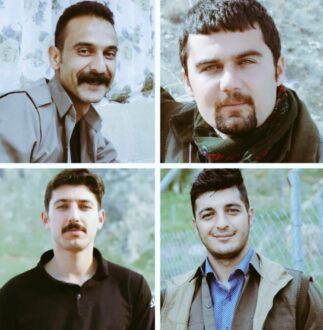Iranwire – “Tehran doesn’t laugh at anyone, but death.
It doesn’t enjoy anything, except death.”
This is an excerpt of the poem “Taran” by Shirko Bekas, dedicated to Mahsa Amini, a Kurdish woman who died while in police custody in September 2022, triggering months of nationwide protests against the Islamic Republic. The poem gained popularity on social media.
The execution of four Iranian Kurdish prisoners – Mohammad Faramarzi, Mohsen Mazloum, Wafa Azarbar and Pejman Fatehi – prompted widespread condemnations, both within and outside of Iran.
These four young men, who endured imprisonment and torture in Tehran for 19 months, were executed at Ghezelhesar prison early on January 29.
In July 2022, the four young Kurds were apprehended by security forces in the village of Somay Bradoost, in West Azerbaijan province.
At the time, the Ministry of Intelligence reported the arrest of 10 individuals allegedly belonging to a “terrorist network affiliated with separatist villains in the northwest.”
On August 27, the ministry labeled those arrested as members of the Komala Party of Iranian Kurdistan, and accused them of being part of a “terrorist team sent by Israel’s Mossad” intelligence service.
The Ministry of Intelligence claimed to have uncovered 16 bombs in their possession, asserting that they planned to target an “industrial factory” in Isfahan.
Separately, the Intelligence Organization of the Police Command announced on July 28 the arrest of five people associated with Israel who were involved in arson, propaganda against the Islamic Republic and sabotage operations.
The Komala Party of Iranian Kurdistan later issued a statement revealing the arrest of four of its members and holding Iranian security institutions accountable for their well-being.
The party emphasized that the detainees were engaged in the party’s activities in the border area of West Azerbaijan. It said they did not possess weapons or explosives.
State TV broadcast a film on October 12, alleging that Israel had sent the men to three African countries to undergo training. It claimed that the group practiced in Tanzania on a life-sized model of the industrial factory that Mossad intended to target in Isfahan.
Following the video’s release, no information was released about the case until December 2022, when the lawyer for the four young Kurds, Masoud Shamsnejad, said the Supreme Court had confirmed their death sentences.
The sentences, handed down by Branch 26 of Tehran Revolutionary Court led by the notorious judge Iman Afshari, accused the group of “waging war against God” and “espionage for Israel.”
In an interview with IranWire, Mohammad Mohammadi, the spokesperson of the Komala Party of Iranian Kurdistan, asserts that the video of the forced confessions contains inconsistencies, indicating that the death sentences were based on a scenario fabricated by agents of the Ministry of Intelligence.
Mohammadi highlights the absurdity of the narrative presented in the 43-minute and 24-second film, such as the claim that the accused were taken to three African countries for training.
He also notes the absence of any evidence in the video, such as photos or audio of the suspects in Africa, or their alleged conversations with Mossad agents.
Mohammadi states that the Komala Party of Iranian Kurdistan party calls for unity and negotiation among Iran’s pro-democracy opposition to confront the Islamic Republic.
“This Death Is an Honor for Me”
The spokesman says the families of Azarbar, Mazloum, Fatehi, and Faramarezi received no information about their relatives after their arrest, until the day when their death sentences were slated to be carried out.
He asserts that the families’ repeated attempts to receive information from security institutions about the prisoners were unsuccessful.
Even the lawyer representing the four men aws unable to meet with his clients.
“We have witnessed their families standing alone in front of the prison twice. Our isolation and lack of support allows the easy victimization of our young people in the Islamic Republic,” he says.
Previously, IranWire received reports of people attempting to gather in front of Qezelhesar prison to join the families.
However, the overwhelming presence of security forces and special units prevented these citizens from gathering.
“The families have faced pressure from the security forces throughout these 19 months, including the arrest of Mohsen Mazloum’s brother. He was released on bail,” Mohammadi says.
Among the four men, Fatehi had a young child named Sabah.
During his family’s visit to prison, he told his mother and sister: “This death is an honor for me. Tell my wife not to wear black for me and not to be sad.”
According to Mohammadi, Fatehi wished to see his young child before his execution.
“They promised Pejman they would show him his son and allow him to bid farewell before being taken to the gallows,” Mohammadi said.
It remains unclear whether Fatehi had his final wish granted.
 Shabtabnews In this dark night, I have lost my way – Arise from a corner, oh you the star of guidance.
Shabtabnews In this dark night, I have lost my way – Arise from a corner, oh you the star of guidance.



